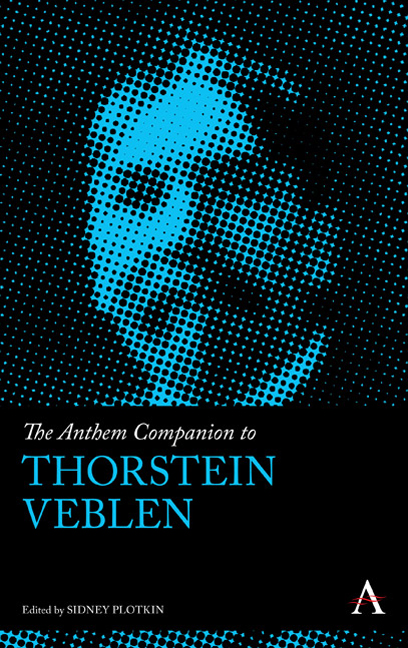Book contents
- Frontmatter
- Dedication
- Contents
- Acknowledgments
- Introduction: Thorstein Veblen's Elusive Project
- Part I METHOD, PHILOSOPHY AND VALUES
- Contents
- Chapter One The Instinct of Workmanship and Other Philosophical Concepts in Thorstein Veblen's Methodology
- Chapter Two Reconsidering Thorstein Veblen's Use of Instincts
- Chapter Three Roman Catholic Critics of Thorstein Veblen and Institutional Economists
- Chapter Four The Metaphysical World of Thorstein Veblen: Of and Beyond the Here and Now
- Chapter Five Veblen's Position on Education Analyzed and Reformulated
- Part II CAPITALISM, SOCIAL STRUCTURE AND POLITICS
- List of Contributors
- Index
Chapter Four - The Metaphysical World of Thorstein Veblen: Of and Beyond the Here and Now
from Contents
Published online by Cambridge University Press: 10 January 2018
- Frontmatter
- Dedication
- Contents
- Acknowledgments
- Introduction: Thorstein Veblen's Elusive Project
- Part I METHOD, PHILOSOPHY AND VALUES
- Contents
- Chapter One The Instinct of Workmanship and Other Philosophical Concepts in Thorstein Veblen's Methodology
- Chapter Two Reconsidering Thorstein Veblen's Use of Instincts
- Chapter Three Roman Catholic Critics of Thorstein Veblen and Institutional Economists
- Chapter Four The Metaphysical World of Thorstein Veblen: Of and Beyond the Here and Now
- Chapter Five Veblen's Position on Education Analyzed and Reformulated
- Part II CAPITALISM, SOCIAL STRUCTURE AND POLITICS
- List of Contributors
- Index
Summary
In a previous essay we explored the physical world of Thorstein Veblen. It would seem, we noted then, ‘that one's life experience refracts his or her perceptions and thoughts and that the physical spaces we inhabit influence our sense of who we are and what ultimately matters’. That is certainly true in Veblen's case, as reflected in the persistent references scholars have made over the years to his ‘strange’, ‘outlandish’, ‘man from Mars’ personality. Virtually all of the academics who have expressed such opinions have themselves been products of the modern urban world and thus ill- equipped to grasp the existential horizons of an individual like Veblen, whose formative experience was rooted in what for his posthumous critics were indeed alien landscapes.
We are also struck by the fact that scholarly interest in Veblen has focused almost exclusively on his academic work, which is understandable from an academician's perspective but on further consideration seems to us to miss what ultimately is most significant in Veblen's life and thought, namely the metaphysical Veblen. By metaphysical we do not mean one who formally theorizes about the nature and ultimate meanings of space, time, matter, mind, existence and the cosmos but rather an engaged thinker intimately aware of the significance of these ever elusive questions for the way we live our lives and whose own life offers instructive insights into the human experience generally. Veblen's life, in other words, and the purposeful way he led it reveal his innermost conclusions about ultimate meanings and how they should guide a sentient, potentially sagacious species.
The key theoretical conclusion evident in Veblen's life and intellectual work is his rejection of teleology as a tenable mode of metaphysical reasoning. On an ideological plane it led him to dismiss the concept of predictable historical outcomes, as in Karl Marx's view of class struggle leading ultimately to the triumph of the exploited over their exploiters. Similarly, had he lived long enough to contemplate the theory of conflict resolution later advanced by the captains of capitalism as an antidote to the Marxist postulate of class struggle, we can assume that Veblen would have dismissed it too as a corollary to yet another teleological formulation of economic theory.
- Type
- Chapter
- Information
- The Anthem Companion to Thorstein Veblen , pp. 101 - 128Publisher: Anthem PressPrint publication year: 2017



